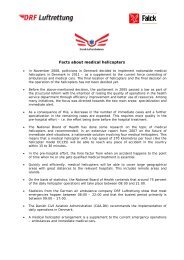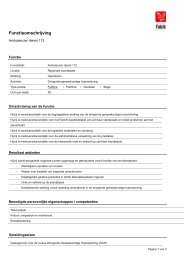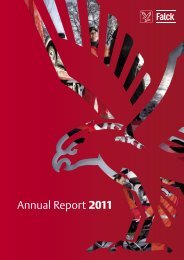Annual Report 2010 - Falck
Annual Report 2010 - Falck
Annual Report 2010 - Falck
Create successful ePaper yourself
Turn your PDF publications into a flip-book with our unique Google optimized e-Paper software.
Notes to the Group financial statements<br />
Note<br />
1 Accounting policies (continued)<br />
rates ruling at the balance sheet date and on the translation<br />
of the share of results for the year from average exchange<br />
rates to exchange rates ruling at the balance sheet date are<br />
recognised directly in other comprehensive income and are<br />
classified in equity in a separate currency translation reserve.<br />
On the divestment of wholly-owned foreign entities, foreign<br />
exchange adjustments accumulated in equity via other comprehensive<br />
income and which can be attributed to entities<br />
are reclassified from the “Currency translation reserve” to<br />
the income statement together with any gain or loss on the<br />
divestment.<br />
On the divestment of partially owned foreign subsidiaries,<br />
the part of the currency translation reserve that relates to<br />
non-controlling interests is not recognised in the income<br />
statement.<br />
On partial divestment of foreign subsidiaries without giving<br />
up control, a proportionate share of the currency translation<br />
reserve is transferred from the parent company shareholders’<br />
to the non-controlling shareholders’ share of equity.<br />
On partial divestment of associates and joint ventures, the<br />
proportionate share of the accumulated currency translation<br />
reserve is reclassified from equity to the income statement.<br />
Any repayment of intercompany balances that are considered<br />
part of the net investment is not considered, in itself, a partial<br />
divestment of subsidiaries.<br />
DERIvATIvE FINANCIAL INSTRUmENTS<br />
Derivative financial instruments are recognised from the trade<br />
date and measured at fair value.<br />
The fair value of derivative financial instruments is recognised<br />
as separate assets or liabilities in other receivables or other<br />
payables, respectively.<br />
The fair value of derivative financial instruments is determined<br />
on the basis of market data and generally accepted pricing<br />
models.<br />
Hedges of net investment<br />
Derivative financial instruments entered into in order to effectively<br />
hedge investments in foreign subsidiaries are recognised<br />
in the balance sheet at the time they are entered into and are<br />
measured at fair value at the balance sheet date. Exchange<br />
gains and losses are recognised directly in equity as a separate<br />
hedging reserve.<br />
Group | <strong>Falck</strong> <strong>Annual</strong> <strong>Report</strong> <strong>2010</strong> 59<br />
Fair value hedges<br />
Derivative financial instruments entered into in order to hedge<br />
other assets and liabilities denominated in foreign currency<br />
are recognised in the balance sheet at the time they are<br />
entered into and are stated at fair value at the balance sheet<br />
date.<br />
Any market value adjustments of derivative financial instruments<br />
entered into to hedge other assets and liabilities are<br />
recognised in the income statement in the same line items as<br />
the transactions hedged.<br />
Cash flow hedges<br />
Changes in the part of the fair value of derivative financial<br />
instruments designated as and qualifying for hedging of<br />
future cash flows, and which effectively hedge changes in the<br />
value of the hedged item, are recognised in equity. When the<br />
hedged transaction is realised, any gains or losses regarding<br />
such hedging transactions are transferred from equity and<br />
recognised in the same financial item as the hedged item.<br />
When proceeds from future borrowings are hedged, any gains<br />
or losses regarding hedging transactions are, however, transferred<br />
from equity over the maturity period of the borrowings.<br />
Forward premiums or forward discounts on forward exchange<br />
transactions are recognised in the income statement during<br />
their terms.<br />
Other derivative financial instruments<br />
For derivative financial instruments which do not meet the<br />
criteria for hedge accounting, changes in the fair value are<br />
recognised in the income statement under financials.<br />
INCOmE STATEmENT<br />
Revenue represents the value of services and goods delivered<br />
and invoiced subscriptions attributable to the financial period,<br />
and is recognised in the income statement if delivery and<br />
transfer of risk to the buyer have taken place before year-end,<br />
and if the income can be reliably measured and is expected to<br />
be received.<br />
The value of services rendered is included on the basis of the<br />
percentage delivered out of the total service.<br />
Revenue from subscriptions is allocated to the income statement<br />
on a straight-line basis.<br />
Revenue from sales of goods is recognised when the significant<br />
risks and rewards of ownership have been transferred to<br />
the buyer.
















